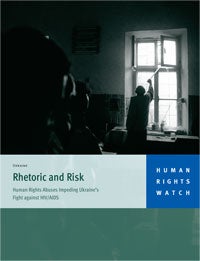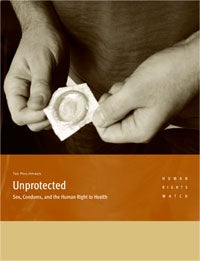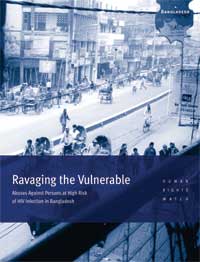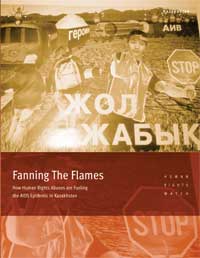 |
 |
 |
 |
“Rhetoric and Risk: Human Rights Abuses Impeding Ukraine's Fight Against HIV/AIDS" Ukraine: March 2006 Ukraine is home to the worst HIV/AIDS epidemic in Europe, and one of the fastest-growing epidemics in the world. The epidemic has been fuelled by harsh drug policies and routine police abuse against drug users – those hardest hit by HIV/AIDS – together with widespread discrimination by health care providers against drug users and people living with HIV/AIDS. Ukraine law and policy incorporates human rights protections – such as guarantees of the right to HIV/AIDS information, to confidentiality of HIV/AIDS test results, to free medical care for people living with HIV/AIDS – and progressive, evidence-based policies – such as syringe exchange and opiate substitution therapy. But these important government commitments have been systematically undermined by chronic human rights abuses by police and health care workers. Physical and psychological abuse by police of injection drug users and sex workers, and discriminatory and dehumanizing treatment by health care workers of drug users and people living with HIV/AIDS have kept many from receiving lifesaving HIV/AIDS information and services. Unless immediate and concerted action is taken, these human rights abuses could undo many of the important steps that Ukraine has taken to stop its HIV/AIDS epidemic. “I have been arrested before at this spot [the needle exchange point]. . . . There were syringes on the ground. A policeman came and picked up the syringe and said, ‘It’s yours,’ and charged me. . . . I am afraid to carry syringes because of police. Sometimes I avoid the needle exchange because of police.” |
 |
“Unprotected: Sex, Condoms, and the Human Right to Health in the Philippines” Philippines: May 2004 Condoms are the single most effective prevention technology against the sexual transmission of HIV, and the cornerstone of HIV/AIDS prevention efforts since the beginning of the epidemic. Yet in many countries – particularly those that face pressure from religious conservatives—legal and policy restrictions on condoms are fueling this epidemic. In the Philippines, the largest Catholic country in Asia, HIV/AIDS advocates who promote the use of condoms have faced an international assault. The Philippine government, under the administration of President Gloria Macapagal-Arroyo, is standing in the way of aggressive HIV prevention strategies by failing to support comprehensive reproductive health legislation. The government has banned the use of national funds for condom supplies, and permits local jurisdictions to prohibit condom distribution in health facilities. Additionally, by failing to provide proper education, the government has implicitly fueled common misconceptions about the ineffectiveness of condoms, which many Filipinos associate exclusively with sin, infidelity or sexual promiscuity. Though condoms are often available to those who can afford private health care, the poorest, most vulnerable members of society have been deprived of this lifesaving prevention method. Without proper education and the widespread availability of condoms, the Philippine government is risking premature and preventable death for many of its citizens. “I like to have plenty of condoms in my bag, but if I see the police, I throw my bag away.”
|
 |
“Ravaging the Vulnerable: Abuses Against Persons at High Risk of HIV in Bangladesh” August 2003 Evidence has shown that early in HIV/AIDS epidemics, when the disease is limited to specific populations engaging in high-risk behaviors, the most effective anti-AIDS strategy is to protect and respect the rights of these people. In Bangladesh, where HIV/AIDS rates are relatively low, the government has taken the opposite approach. Vulnerable groups, such as sex workers, drug users, and men who have sex with men, already marginalized from society, have faced frequent and violent abuse – abduction, rape, arrest and extortion – at the hands of police, as well as mastans, powerful thugs who sometimes act as musclemen for Bangladesh’s political parties. Such abuses have been shown to make these high-risk groups more difficult to reach with HIV prevention services, and less able to protect their own health. These abuses not only violate both Bangladeshi law and international human rights law, but reduce Bangladesh’s capacity to curtail an emerging epidemic. “One night, three police officers came to my hotel room and asked for sex. I was sleepy and refused. They started to beat me, especially on the face, and locked me in the room overnight.” |
 |
“Fanning the Flames: How Human Rights Abuses Are Fueling the AIDS Epidemic in Kazakhstan” June 2003 The government of Kazakhstan has had a rare and limited opportunity to contain the rapidly-growing spread of HIV/AIDS, which in 2003 had infected more than 25,000 people. So far, the spread of HIV/AIDS in this former-Soviet republic has been largely confined to specific populations – in particular, injection drug users (who make up more than 80 percent of those living with HIV/AIDS) and sex workers. But human rights abuses have impeded drug users’ and sex workers’ access to treatment and prevention programs, fueling an epidemic that could be contained. Injection drug users have been regularly subjected to police brutality, denied due process, have faced false criminal charges, and cannot obtain humane or effective substance abuse treatment. Sex workers face rape, violence and extortion by police. Overall, those living with HIV/AIDS have faced social isolation and discrimination in jobs, housing and government services. If the spread of this epidemic is to be curbed, these abuses must be addressed. “Sometimes I injected three or four times with the same needle... or used dirty needles... when I didn't have enough money on me for new needles, and because of the police it was too frightening to go to the drugstore.” |
 |
“Epidemic of Abuse: Police Harassment of HIV/AIDS Outreach Workers in India” India, July 2002 India has seen a sharp increase in the number of its people living with HIV/AIDS, from a few thousand in the early 1990s to an estimated 5.7 million adults and children in 2005. Sex workers, injection drug users and men who have sex with men have alarmingly high rates of infection, and the epidemic has begun spreading to the general population. The Indian government has recognized that in order to combat the spread of this disease, programs that provide information, condoms and HIV-testing are crucial. Yet despite support among the public health sectors for such programs, outreach efforts have been undermined by police harassment and abuse of HIV/AIDS workers. Police have beaten peer educators, claimed that outreach work promotes prostitution, and bought trumped-up criminal charges against activists. AIDS outreach workers have also been accused by police of being “threats to national security.” In order to appropriately address and combat the spread of this disease, the government of India must recognize the importance – and ensure the safety – of these outreach programs and their staff. “No one believes us about peer education; we are always accused of being sex workers. The police don't listen. They beat us in the street itself.” |
